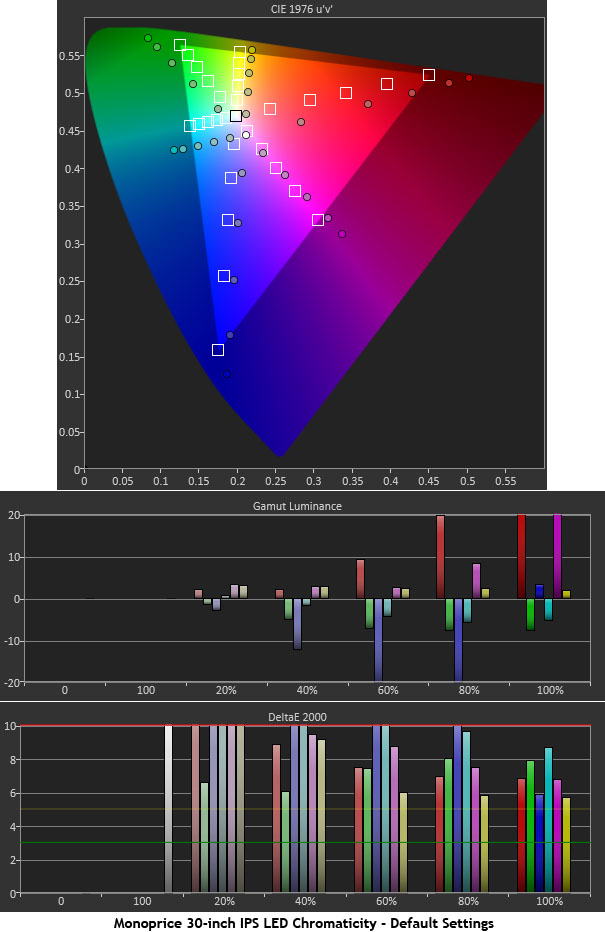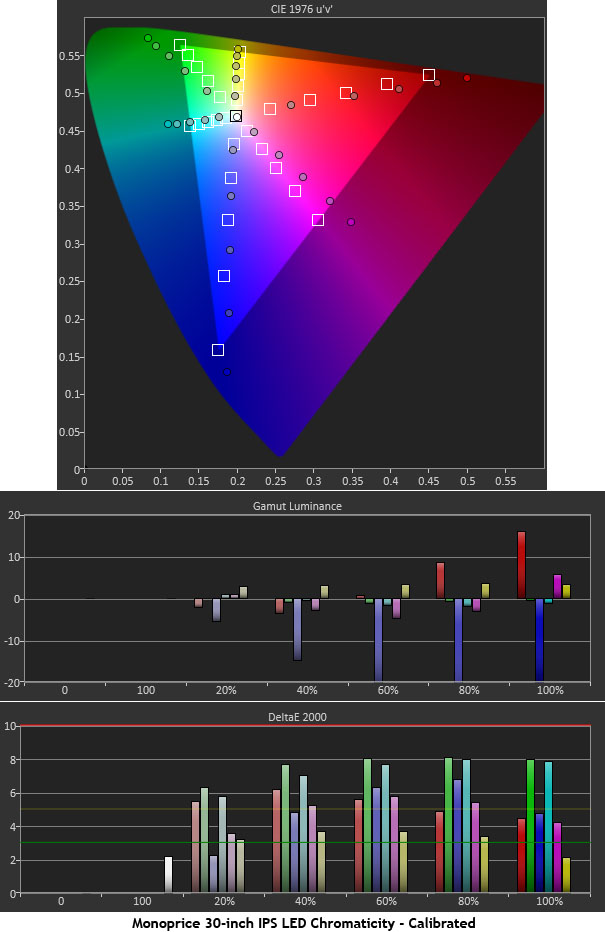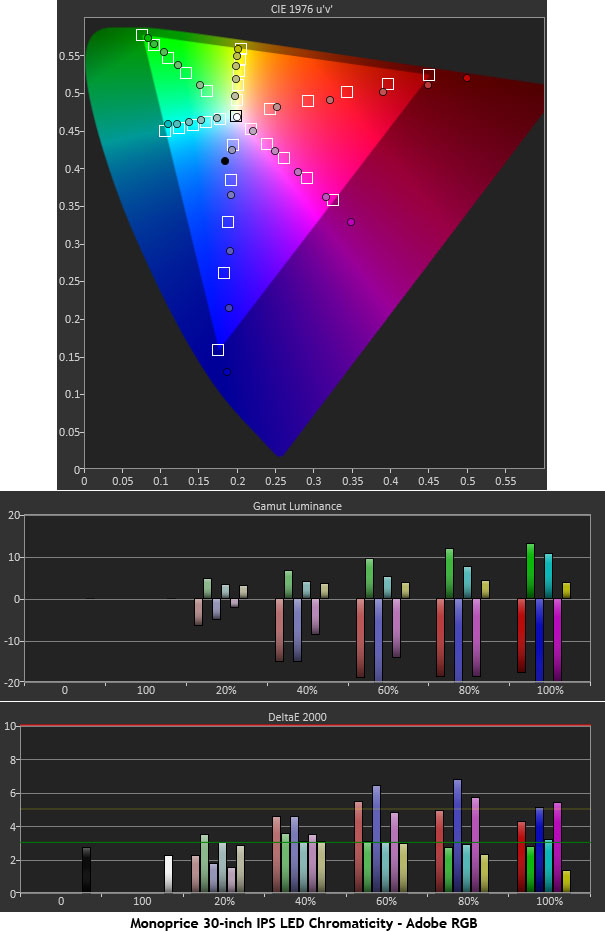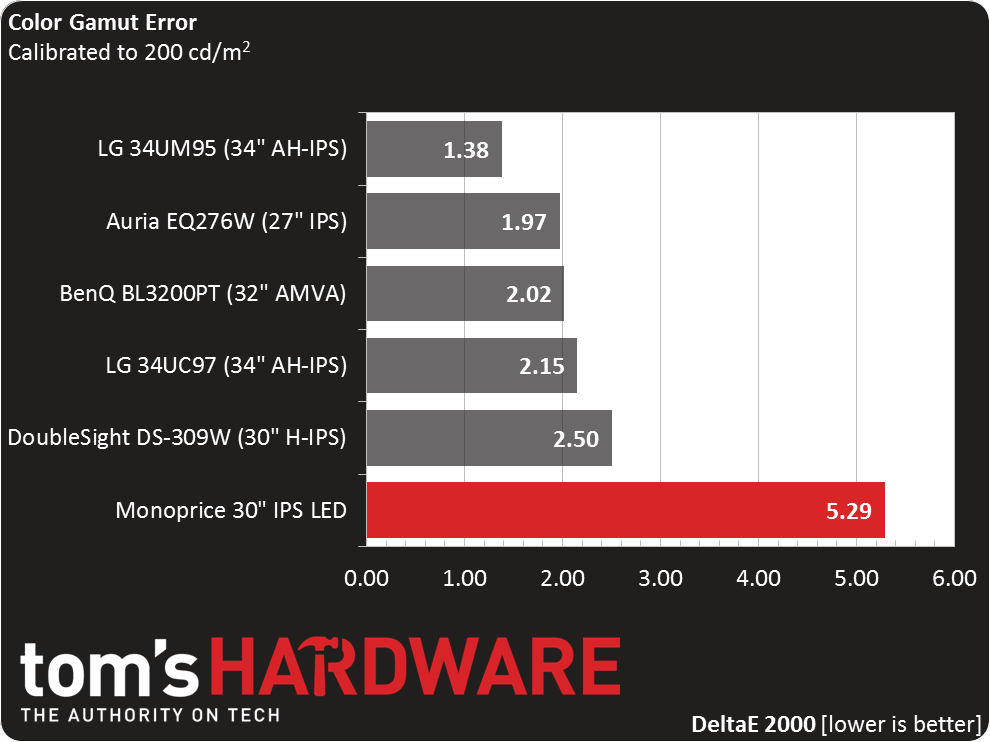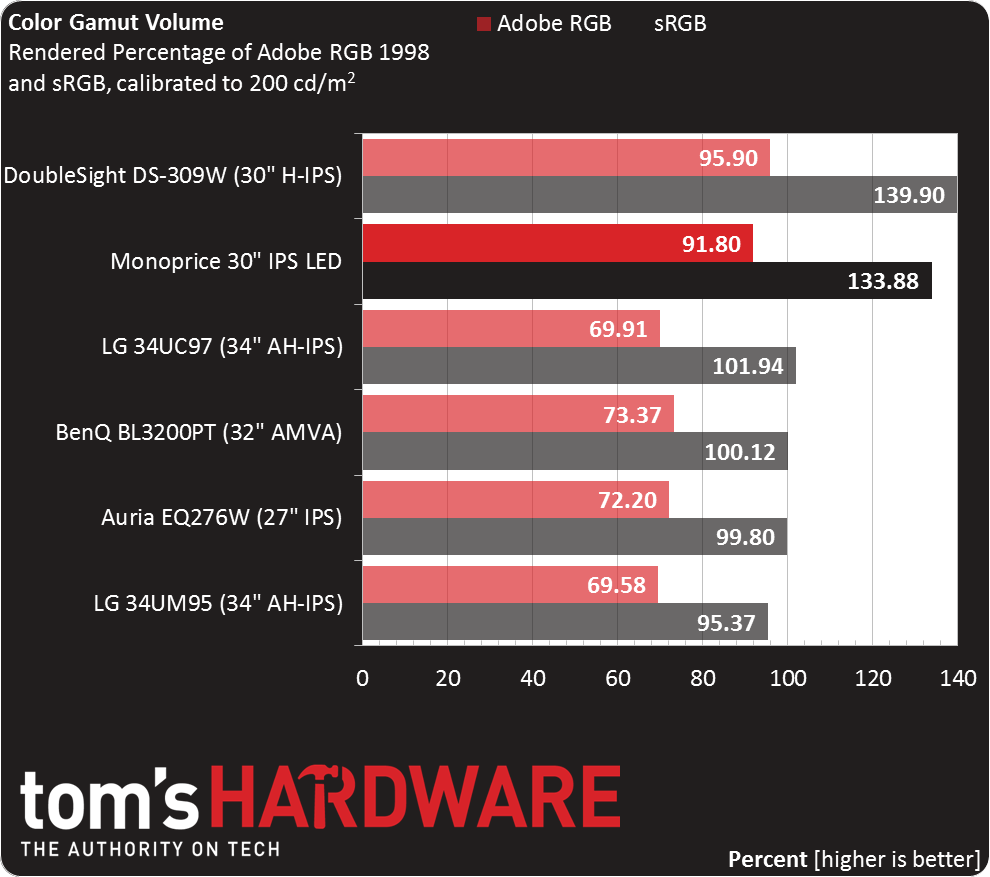Monoprice 30-inch IPS LED Monitor Review
In the land of value-priced peripherals, Monoprice is king. After adding monitors to its many offerings, we decided to check one out in our lab. This 30-inch IPS LED screen definitely qualifies as jumbo. Today we see how it performs.
Why you can trust Tom's Hardware
Results: Color Gamut And Performance
For details on our color gamut testing and volume calculations, please click here.
Our CIE chart shows the effect of the grayscale errors clearly. The entire gamut is pulled off-target by the white point. This demonstrated the importance of grayscale calibration and how it affects overall color quality and accuracy.
Monoprice doesn’t specify the native color gamut of its 30-inch IPS/LED, but our initial chart suggests it’s Adobe RGB. We thought it might be using the same panel part as DoubleSight’s DS-309W, but since that monitor has a CCFL backlight, it can’t be. Checking our database reveals that LG only makes one 30-inch 16:10 part with a GB-r-LED backlight and it is indeed rated for Adobe RGB 1998 coverage.
After calibration, things are much better. But we’re still seeing over-saturation across the board. Red is the worst offender with errors as high as 25 percent. Just to confirm our suspicions, we’ll make another measurement run using the Adobe RGB gamut as our standard.
Sure enough, this is a wide-gamut monitor. Though the results are much better, the red/magenta/blue side of the triangle is still over-saturated. The problem in our eyes is that most purchasers of this display will be using it for general computing and entertainment. Even with calibration, film and gaming content still looks overblown, especially in the red and blue tones.
Now we return to the comparison group:
A result of 5.29 DeltaE represents the average error when calculated in the sRGB color space. Compared to the Adobe RGB 1998 gamut, it improves to 3.64. And here’s a little surprise – when we ran the test against the Rec.2020 standard for Ultra HD, it came up 3.94dE. So if you happen to need a mastering monitor for really large-gamut content, the Monoprice turns out to be a good choice.
Get Tom's Hardware's best news and in-depth reviews, straight to your inbox.
Gamut Volume: Adobe RGB 1998 And sRGB
Given our CIE results, you’d think the Adobe RGB volume would be over 100 percent. Look at the green primary, though. It doesn’t quite make it to the highest saturation level. If you plan to use the Monoprice as a wide-gamut monitor, a software LUT calibration is required to match it with the rest of your production suite. And for those using it for gaming and general computing, color will look over-saturated all around unless you perform the same LUT adjustment. A package like CalMAN or Spyder can help you accomplish this.
Current page: Results: Color Gamut And Performance
Prev Page Results: Grayscale Tracking And Gamma Response Next Page Results: Viewing Angles, Uniformity, Response, And Lag
Christian Eberle is a Contributing Editor for Tom's Hardware US. He's a veteran reviewer of A/V equipment, specializing in monitors. Christian began his obsession with tech when he built his first PC in 1991, a 286 running DOS 3.0 at a blazing 12MHz. In 2006, he undertook training from the Imaging Science Foundation in video calibration and testing and thus started a passion for precise imaging that persists to this day. He is also a professional musician with a degree from the New England Conservatory as a classical bassoonist which he used to good effect as a performer with the West Point Army Band from 1987 to 2013. He enjoys watching movies and listening to high-end audio in his custom-built home theater and can be seen riding trails near his home on a race-ready ICE VTX recumbent trike. Christian enjoys the endless summer in Florida where he lives with his wife and Chihuahua and plays with orchestras around the state.
-
MxMatrix I saw an ASUS UHD PB279Q (ips panel) for roughly the same price.Reply
So I'm not even going to bother for 30" if its possible to get UHD. -
mitch074 I really wonder why Tom's never evaluates Iiyama screens - the ProLite XB2776QS is a 27" 2560x1440 IPS screen, available at the time for $450 with a zero pixel defect, 3 years on-site replacement warranty, sRGB factory-calibrated profile that does work... And it came out in 2013. I own one, and although its reliability initially left much to be desired (3 replacements for defects : one light leak, one dead subpixel, one power issue), it was replaced every time in less than 72 hours by Iiyama - and yes, including once when I picked up one dead (black) subpixel. It has since been replaced by a model with the very same specifications and prices, but more reliable electronics.Reply -
nekromobo Why wouldn't a 34" 800$ IPS 21:9 (Dell U3415W) compete with this or the other similar displays. Also the external power brick is big nono unfortunely :(Reply -
Karsten75 It seems Overlord isn't selling any more monitors, so I guess references to Overlord monitors should be removed?Reply -
achoo2 With all the "though this feature is not described on the website" items and my unfamiliarity with the brand, I'd be reluctant to buy this monitor for fear that my device wouldn't match the review sample.Reply -
DisplayJunkie As much as we all love Monoprice for their excellent pricing and quality on things like cables, this display is another catastrophic failure, or more likely an attempt to pander to the uninformed:Reply
- no backlight control. Right out of the gate, the display is useless. How can they fail so badly at the most basic and crucial aspect of a monitor? This is an exact repeat of the Zero-G by the way.
- contrast sucks and attempting to control backlight level makes it even worse. Again same as the Zero-G.
- Adobe RGB accuracy is not even good enough even for amateur photo/print work (and that's *after* calibration with a $250 device!), and no sRGB mode means the display is useless for everyone else / every other usage scenario
All I see is pandering to the uninformed, trying to sell poorly implemented panels to those who are impressed by the large size and resolution.
If it had a functional backlight control and cost maybe $500 max then it would be worth considering. -
bit_user Something I've always wondered about Monoprice is whether they actually: a) design anything themselves, b) produce specifications and select bids from manufacturers, or c) just import products that (usually Chinese) companies are already making.Reply
Can someone please clarify?
-
DarkSable Reply15244178 said:I really wonder why Tom's never evaluates Iiyama screens - the ProLite XB2776QS is a 27" 2560x1440 IPS screen, available at the time for $450 with a zero pixel defect, 3 years on-site replacement warranty, sRGB factory-calibrated profile that does work... And it came out in 2013. I own one, and although its reliability initially left much to be desired (3 replacements for defects : one light leak, one dead subpixel, one power issue), it was replaced every time in less than 72 hours by Iiyama - and yes, including once when I picked up one dead (black) subpixel. It has since been replaced by a model with the very same specifications and prices, but more reliable electronics.
I've got one of those too, but because the model I ordered wasn't available in my region, they've never supported me... instead trying to get me to communicate with a german company that offers no warranty.
While iiyama monitors are very good, I've noticed that they almost all share two issues:
1) coil whine from the power subsystem. Every single iiyama I've owned either has cheap caps or just not enough insulation, and has audible coil whine even when off.
2) Poor support for low brightness. This is actually a really annoying one for me - iiyama monitors are bright and don't have enough support on the low end; even at its lowest brightness setting with contrast down just above where it would drive me crazy, my iiyama is still brighter than any other monitor I've had.
